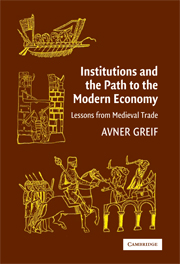Book contents
- Frontmatter
- Contents
- Abbreviations
- Preface
- I Preliminaries
- II Institutions as Systems in Equilibria
- III Institutional Dynamics as a Historical Process
- 6 A Theory of Endogenous Institutional Change
- 7 Institutional Trajectories: How Past Institutions Affect Current Ones
- 8 Building a State: Genoa's Rise and Fall
- 9 On the Origin of Distinct Institutional Trajectories: Cultural Beliefs and the Organization of Society
- IV The Empirical Method of Comparative and Historical Institutional Analysis
- V Concluding Comments
- Appendixes
- References
- Index
- POLITICAL ECONOMY OF INSTITUTIONS AND DECISIONS
8 - Building a State: Genoa's Rise and Fall
Published online by Cambridge University Press: 05 September 2012
- Frontmatter
- Contents
- Abbreviations
- Preface
- I Preliminaries
- II Institutions as Systems in Equilibria
- III Institutional Dynamics as a Historical Process
- 6 A Theory of Endogenous Institutional Change
- 7 Institutional Trajectories: How Past Institutions Affect Current Ones
- 8 Building a State: Genoa's Rise and Fall
- 9 On the Origin of Distinct Institutional Trajectories: Cultural Beliefs and the Organization of Society
- IV The Empirical Method of Comparative and Historical Institutional Analysis
- V Concluding Comments
- Appendixes
- References
- Index
- POLITICAL ECONOMY OF INSTITUTIONS AND DECISIONS
Summary
Many contemporary countries face the challenge of building states that effectively promote political stability, curtail political violence, and foster economic prosperity. Late medieval Europe witnessed a wave of attempts to create such states, particularly in the form of the city-states of northern Italy (see, e.g., Waley 1988). No microanalytical examination of this process of state building has been conducted, and its lessons have not been uncovered.
This chapter examines the state-building process in the city-state of Genoa, which emerged from obscurity to become one of the wealthiest cities in Europe but whose history was characterized by frequent intracity political violence and later also by relative economic decline. This Chapter provides a microanalytical examination of the historical process of state building in Genoa, explicitly studying the polity as an equilibrium outcome in which actors can choose between predatory and economic behavior.
Two perspectives dominate the study of the relationships between political institutions and economic prosperity, neither of which adequately accounts for Genoa's experience. The first perspective assumes the existence of a predator-ruler, a ruler with a monopoly over coercive power. According to this view, promoting prosperity entails building institutions that enable the ruler to credibly commit to respecting property rights. This perspective cannot be applied to the city-state of Genoa, which had no de facto ruler with or without a monopoly over coercive power at the time it was established.
- Type
- Chapter
- Information
- Institutions and the Path to the Modern EconomyLessons from Medieval Trade, pp. 217 - 268Publisher: Cambridge University PressPrint publication year: 2006
- 1
- Cited by



